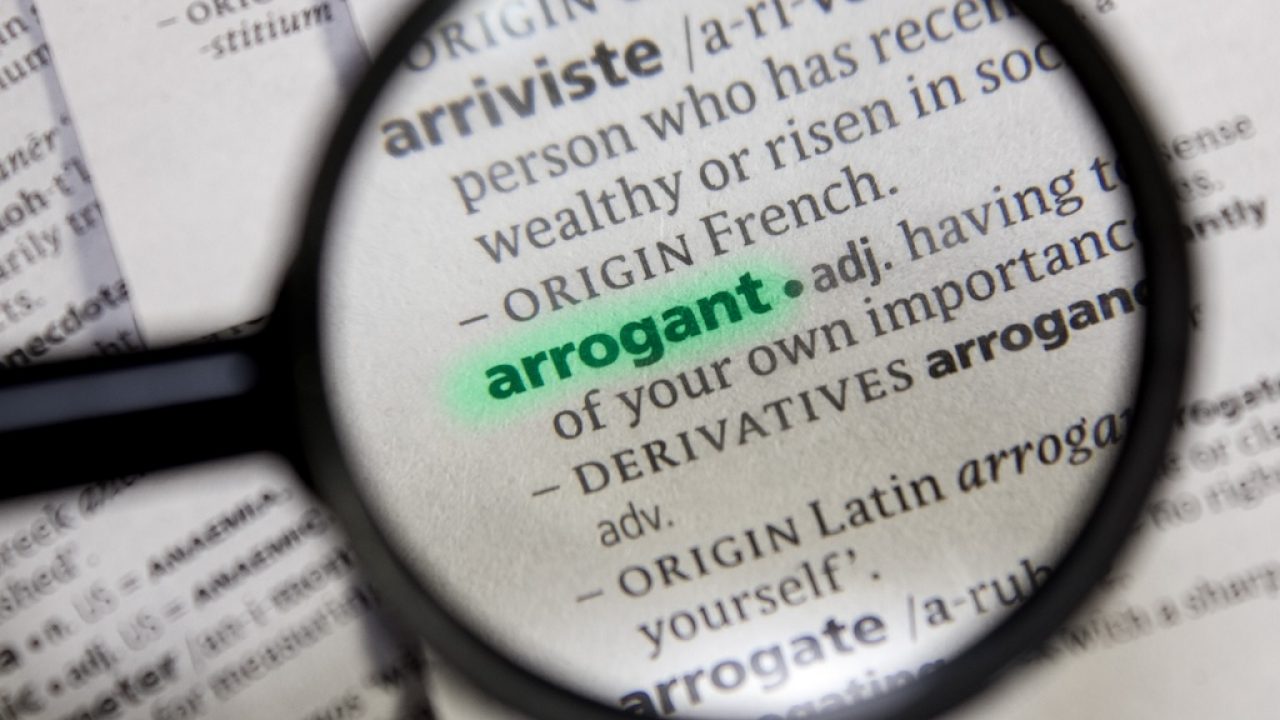
Arrogance | The Review of Religions

© Shutterstock
The Promised Messiah (as) wrote over 80 books in Arabic, Urdu, and Persian. Excerpts of his collected works have been translated into English and organised by topic.
The Review of Religions is pleased to present these excerpts as part of a monthly feature. Here, the Promised Messiah (as) explains the different forms of arrogance and how they deprive a person of virtue.
Extracts from The Essence of Islam – Vol. II, pp. 355-362.
I tell you truly that on the Day of Judgement, next after association of anything with God, no vice shall rank as high as arrogance. This is a vice that humiliates a person in both worlds. Divine mercy rescues every believer in divine unity, except an arrogant one. Satan also claimed that he believed in the unity of God but, as he was afflicted with arrogance and looked contemptuously upon Adam whom God loved and found fault with him. He was ruined and became accursed. Thus the first sin whereby one was ruined forever was arrogance.
—A’ina-e-Kamalat-e-Islam, Ruhani Khaza’in, vol. 5, p. 598
What is Arrogance?
I admonish my Community to shun arrogance as arrogance is hateful in the eyes of God, the Lord of Glory. You may not perhaps fully realise what is arrogance. Then listen to me as I speak under the direction of God. Everyone who looks down upon a brother because he esteems himself more learned, or wiser, or more proficient than him is arrogant, inasmuch as he does not esteem God as the Fountainhead of all intelligence and knowledge and deems himself as something. Has God not the power to afflict him with lunacy and to bestow upon his brother, whom he accounts small, better intelligence and knowledge and higher proficiency than him? So also he who, out of a mistaken conception of his wealth, or status, or dignity, looks down upon his brother, is arrogant because he forgets that his wealth, status and dignity were bestowed upon him by God. He is blind and does not realise that God has power to so afflict him that in a moment he might be reduced to the condition of the lowest of the low, and to bestow upon his brother whom he esteems low greater wealth than him. In the same way, he who takes pride in his physical health, or is conceited of his beauty, good looks, strength, or might and bestows a scornful designation on his brother making fun of him and proclaims his physical defects is arrogant, for he is unaware of God Who has power to afflict him with such physical defects as to render him worse than his brother and to bless the latter so that his faculties should not suffer decline or be stultified over a long period, for He has power to do all that He wills. Similarly, he who is neglectful of prayer on account of his dependence upon his faculties is arrogant for he has not recognised the Fountainhead of all power and strength and relies upon himself. Therefore, dear ones! keep all these admonitions in mind lest you should be accounted arrogant in the estimation of God Almighty unknowingly.
He who out of pride corrects the pronunciation of a word by his brother partakes of arrogance. He who does not listen courteously to his brother and turns away from him partakes of arrogance. He who resents a brother sitting next to him partakes of arrogance. He who mocks and laughs at one who is occupied in prayer partakes of arrogance. He who does not seek to render full obedience to a commissioned one and messenger of God partakes of arrogance. He who does not pay full attention to the directions of such a one and does not study his writings with care also partakes of arrogance. Try, therefore, that you should not partake of arrogance in any respect so that you may escape ruin and you and yours may attain salvation. Lean towards God and love Him to the utmost degree possible and fear Him as much as anyone can be feared in this life. Be pure-hearted and pure-intentioned and meek and humble and free of all mischief so that you may receive mercy.
—Nuzul-ul-Masih, Ruhani Khaza’in, vol. 18, pp. 402-403
Do Not Idolise Me
It is not my way that I should look so fierce and awe-inspiring that people should fear me as they fear a wild beast. I hate to be idolised. I have come to abolish idol worship and not to become an idol myself so that people should worship me. God Almighty knows well that I do not prefer myself to others in the slightest degree. In my estimation, there is no greater idol worshipper nor anyone more wicked than an arrogant one. Such a one worships no God, he only worships himself.
—Malfuzat, vol. II, pp. 6-7
Remember that arrogance is allied to falsehood. The worst falsehood is that which accompanies arrogance. That is why God, the Glorious, smashes the head of an arrogant one before all others.
—A’ina-e-Kamalat-e-Islam, Ruhani Khaza’in, vol. 5, p. 599
Forms of Arrogance and Means of Purification
It is easy for a person to discard the principal vices, but some vices are so subtle and hidden that one is not normally conscious of them, and even when one becomes conscious of them it is difficult to discard them. For instance, typhoid which is a severe illness and a high fever can be treated immediately with appropriate remedies, but tuberculosis which works its mischief out of sight is very difficult of treatment. Such are these subtle and hidden vices which keep a person from achieving exalted ranks. They are moral vices which cause disruption in social life. Slight differences generate rancour, hatred, jealousy, hypocrisy and arrogance and a brother begins to look down upon a brother. If a person observes salat [the five obligatory prayers] properly for a few days and people praise him, he falls a victim to showing off, pride and self-esteem and loses that sincerity which is the true purpose of worship. If Allah, the Glorious, bestows wealth, knowledge, high family status or honour on a person he begins to look down upon a brother who does not enjoy those advantages. If through obstinacy or enmity a person’s relations with a brother are embittered he devotes himself day and night to finding fault with his brother or carries tales against him to someone in authority so that by winning the favour of the latter he might replace his brother in some office held by him, while he himself suffers from all those faults. Such are the subtle vices which are difficult to discard. Arrogance is one of them and is manifested in diverse forms. The divines suffer from it in respect of their knowledge. They are occupied all the time in finding fault with each other at the intellectual level so as to humiliate each other and to bring each other into contempt. It is very difficult to get rid of such subtle vices, but they are not tolerable under divine law. It is not only the common people who are afflicted with them but also those who shun well-known vices and are esteemed as divines and scholars and people of high degree. Deliverance from these subtle vices is like undergoing a sort of death. Until a person is delivered from the darkness of such vices he cannot achieve complete purity of soul and cannot become worthy of those bounties and excellence that are bestowed by God Almighty on purification of the soul. Some people deem themselves as having been delivered from such moral vices, but when they are confronted with another person they are greatly roused and are not able to suppress their high notion of self-esteem and their arrogance and exhibit such a low quality of morals of which they themselves had no conception. It is at such times that it is known that they have found no deliverance from such vices and have not yet achieved any good, and that they are still far short of that purification of the soul, which is a characteristic of the righteous and is a sign of true excellence. This shows that moral purification is very difficult and cannot be achieved without the grace of Allah, the Glorious. Such grace is also attained through the three means that have just been mentioned, namely, first, striving and planning; secondly, Prayer and supplication; and thirdly, keeping company with the righteous.
—Speeches, pp. 17-18
Arrogance is an affliction that constantly affects man. Keep in mind that arrogance comes from Satan and converts an arrogant one into Satan. Until a person turns wholly away from the path of arrogance he is not enabled to accept the truth and does not become worthy of receiving divine grace, inasmuch as arrogance bars his way. So shun every type of arrogance, whether generated by learning, wealth, status, caste, family or noble descent. These are the factors that give birth to arrogance. Until a person purifies himself of all such pride he cannot win divine approval and become a chosen one of God. He is not bestowed such comprehension of the Divine as totally consumes the passions of self. Such pride is the characteristic of Satan and is displeasing to God. Satan manifested such pride, conceived that he was better than Adam and claimed:
[1] أَنَا۠ خَيۡرٞ مِّنۡهُ خَلَقۡتَنِي مِن نَّارٍ وَخَلَقۡتَهُۥ مِن طِينٍ
The result was that he was rejected and expelled from the presence of God.
—Speeches, p. 19
The Sufis have said that there are many types of low qualities inside a person, like evil spirits, and they continue to be expelled till the last of them is left which is arrogance. It can be expelled only by divine grace, which is won through sincere striving and supplications.
Many persons deem themselves humble but suffer from some type of arrogance. Therefore, one must seek to avoid even the subtlest types of arrogance, which are generated sometimes by wealth, when a wealthy one deems others misers who cannot be his equals; sometimes arrogance is generated by family and caste, when a person deems himself of high caste and looks down upon others as of low caste…
Sometimes arrogance is generated by learning. A person makes a mistake in speaking and an arrogant one immediately seizes upon his mistake and shouts that he cannot utter a single word right. In short, there are diverse types of arrogance and all of them deprive a person of virtue and stand in the way of his beneficence towards his fellow beings. All of them must be shunned. But this calls for a type of death. So long as a person does not accept such a death, divine blessing does not descend upon him, nor does God become responsible for him.
—Malfuzat, vol. VI, pp. 401-403
What is Islam? To die for the sake of God; And forsake all desires of self for His pleasure.
Those who accepted death are the ones who are destined to live forever; Life is not attained in this path except through the humble acceptance of death.
Brazenness and arrogance are the characteristics of Satan the accursed; The true progeny of Adam are the humble.
O worm of this earth! Give up arrogance and pride; For pride becomes the Glorious Lord alone.
Consider yourselves as worse than all; Maybe this will help you enter the court of the Lord God.
Give up pride and arrogance, because therein alone lies righteousness; Be humble as dust: therein lies the pleasure of the Lord.
The root of righteousness is humility for the sake of God; Virtue, which is the condition of faith, lies entirely in taqwa (righteousness).
—Barahin-e-Ahmadiyya, Part V, Ruhani Khaza’in, vol. 21, p. 18
ENDNOTES
1. ‘I am better than he. Thou hast created me of fire and him hast Thou created of clay.’ – The Holy Qur’an, 38:77.



